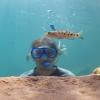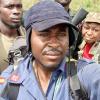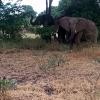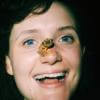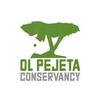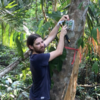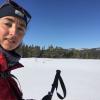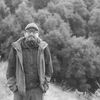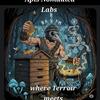Acoustic sensors enable efficient and non-invasive monitoring of a wide range of species, including many that are difficult to monitor in other ways. Although they were initially limited in application scope largely due to cost and hardware constraints, the development of low-cost, open-source models like the Audiomoth in recent years has increased access immensely and opened up new avenues of research. For example, some teams are using them to identify illicit human activities through the detection of associated sounds, like gunshots, vehicles, or chainsaws (e.g. OpenEars).
With this relatively novel dimension of wildlife monitoring rapidly advancing in both marine and terrestrial systems, it is crucial that we identify and share information about the utility and constraints of these sensors to inform efforts. A recent study identified advancements in hardware and machine learning applications, as well as early development of acoustic biodiversity indicators, as factors facilitating progress in the field. In terms of limitations, the authors highlight insufficient reference sound libraries, a lack of open-source audio processing tools, and a need for standardization of survey and analysis protocols. They also stress the importance of collaboration in moving forward, which is precisely what this group will aim to facilitate.
If you're new to acoustic monitoring and want to get up to speed on the basics, check out these beginner's resources and conversations from across the WILDLABS platform:
Three Resources for Beginners:
- Listening to Nature: The Emerging Field of Bioacoustics, Adam Welz
- Ecoacoustics and Biodiversity Monitoring, RSEC Journal
- Monitoring Ecosystems through Sound: The Present and Future of Passive Acoustics, Ella Browning and Rory Gibb
Three Forum Threads for Beginners:
- AudioMoth user guide | Tessa Rhinehart
- Audiomoth and Natterjack Monitoring (UK) | Stuart Newson
- Help with analysing bat recordings from Audiomoth | Carlos Abrahams
Three Tutorials for Beginners:
- "How do I perform automated recordings of bird assemblages?" | Carlos Abrahams, Tech Tutors
- "How do I scale up acoustic surveys with Audiomoths and automated processing?" | Tessa Rhinehart, Tech Tutors
- Acoustic Monitoring | David Watson, Ruby Lee, Andy Hill, and Dimitri Ponirakis, Virtual Meetups
Want to know more about acoustic monitoring and learn from experts in the WILDLABS community? Jump into the discussion in our Acoustic Monitoring group!
Header image: Carly Batist
No showcases have been added to this group yet.
Fauna & Flora
- 0 Resources
- 0 Discussions
- 3 Groups
Ph.D Speech-Hearing Sciences; 3D Designer/Printer interested in building/testing/deploying standardized environmental recording platforms for scientists and engineers in developing countries.
- 0 Resources
- 0 Discussions
- 10 Groups

- 0 Resources
- 9 Discussions
- 3 Groups

- 0 Resources
- 2 Discussions
- 3 Groups
- @Alino
- | Alain
I am a zoologist and I am interested in biodiversity and the conservation of insects and mammals
- 0 Resources
- 0 Discussions
- 3 Groups
- @thomasmutonhori
- | TM
Ecologist
- 0 Resources
- 0 Discussions
- 4 Groups
San Diego Zoo Wildlife Alliance
Lead, San Diego Zoo Conservation Technology Lab
- 0 Resources
- 0 Discussions
- 2 Groups
- @Becky_Heath
- | She/ Her
University of Cambridge & Imperial College London
Interdisciplinary scientist working in field data collection methods and tropical agriculture

- 0 Resources
- 9 Discussions
- 7 Groups
I am a Senior researcher and PI in Conservation and Animal Ecology at Fondazione Edmund Mach, Trento, Italy. I am coordinator of EUROMAMMALS, member of the advisory board of the Global Initiative on Ungulate Migration at CMS, and President of the International Bio-Logging Society
- 0 Resources
- 0 Discussions
- 5 Groups
- 0 Resources
- 0 Discussions
- 7 Groups
I am biologist, I have studied wild life and ethnobiology at Amazon and caimans in Brazil
- 0 Resources
- 0 Discussions
- 10 Groups
Wildlife Acoustics
- 0 Resources
- 1 Discussions
- 1 Groups
Ol Pejeta Conservancy partners with conservation and technology organisations to kick-start a research and innovation centre for wildlife conservation
31 May 2019
In February, we released an open call for the WILDLABS TECH HUB, offering 3 months of support for solutions using technolgy to tackle the illegal wildlife trade. We were overwhelmed by an incredible 37 submissions,...
13 May 2019
Happy World Wildlife Day! To celebrate, this week we've asked our community to share photos showing how they are using tech in the field or the lab, using the #Tech4Wildlife hashtag.
3 March 2019
In this case study, Science Reporter Jamie Morton tells the story of how Kiwi scientists are teaming up with a local underwater robotics company to gain world-first insights into the lives of whales in Antarctica.
4 February 2019
As human impacts on the world accelerate, so does the need for tools to monitor the effects we have on species and ecosystems. In this article, Ella Browning and Rory Gibb share insights from their recent review paper...
4 December 2018
Article
In this case study, conservation ecologist Ayesha Tulloch takes us behind the scenes of her recent paper, which came out in Nature Ecology & Evolution earlier this month. In this paper, Ayesha and her team present a...
20 August 2018
Last month, the 2018 Ecoacoustics Congress was held in Brisbane. Bringing together scientists, natural resource managers, industry and artists, participants explored the ways that sound can deepen our understanding of...
25 July 2018
This latest chapter in the Conservation Technology Series from WWF-UK looks at the opportunities, challenges and state-of-the-art of satellite remote sensing for conservation applications. This issue reviews available...
23 April 2018
Hundreds of people joined our #Tech4Wildlife photo challenge this year, showcasing all the incredible ways tech is being used to support wildlife conservation. We've seen proximity loggers on Tasmanian Devils in...
3 March 2018
Our panel of international experts has been hard at work reviewing the 47 proposals we recieved for innovative technological tools to address human wildlife conflict. The panelists have systematically been assessing the...
20 October 2017
The inherent complexity of not only deploying technologies in the field but also doing so in a scientifically rigorous manner can prove a substantial barrier for the effective use of conservation technologies, and clear...
11 October 2017
Its been a busy couple of months for the Open Acoustic Devices team. They've just returned back from Belize where they have been trialling the new AudioMoth design for gunshot detection. Find out what they've been up to...
27 June 2017
August 2025
event
September 2025
event
October 2025
November 2025
event
January 2023
event
November 2022
event
event
event
64 Products
Recently updated products
| Description | Activity | Replies | Groups | Updated |
|---|---|---|---|---|
| Over the years, we have experienced AI in vision & speech. We have seen growth in LLMs. But, we could also have large sound... |
|
Acoustics | 18 minutes 56 seconds ago | |
| As someone from the future, thank you for posting this update! |
|
Acoustics | 5 days 21 hours ago | |
| Dear Colleagues,I hope this message finds you well. I am Manuel Sánchez Nivicela., an independent ornithology researcher based in Ecuador,... |
|
Funding and Finance, Acoustics, Latin America Community | 6 days 15 hours ago | |
| Kudos for such an innovative approach—integrating additional sensors with acoustic recorders is a brilliant step forward! I'm especially interested in how you tackle energy... |
|
Acoustics, AI for Conservation, Latin America Community, Open Source Solutions | 1 week 1 day ago | |
| 🐝 Apis Nomadica Labs: Mapping Royal Jelly Terroir Through Mobile Bee BiotechAbout Us:Apis Nomadica Labs is a mobile apiary research... |
|
Acoustics, Conservation Tech Training and Education, Animal Movement, Human-Wildlife Coexistence | 1 week 3 days ago | |
| Awesome, I think I get what you mean! Thank you! |
|
Acoustics | 2 weeks 3 days ago | |
| This is such a compelling direction, especially the idea of linking unsupervised vocalisation clustering to generative models for controlled playback. I haven’t seen much done... |
|
Acoustics, AI for Conservation, Emerging Tech | 2 weeks 3 days ago | |
| Hi Josept! Thank you for sharing your experience! This types of feedback are important for the community to know about when choosing what tech to use for their work. Would you be... |
|
Acoustics, Latin America Community, Software Development | 3 weeks 2 days ago | |
| Another option you can try is HawkEars, which is a classifier made particularly for Canadian birds. Unlike BirdNET, it doesn't have a graphical interface, though. |
|
Acoustics | 3 weeks 2 days ago | |
| PROJECT UPDATE: We are curating an open-access, annotated acoustic dataset for India! 🇮🇳🌿This project has two main goals:🎧 To develop a freely available dataset of annotated... |
|
Acoustics | 1 month ago | |
| Just to provide an update to my post from 2021. Colleagues and I at the BTO have built a species classifier now for the BTO Acoustic Pipeline for the sound identification of all... |
+10
|
Acoustics | 1 month ago | |
| Thanks @Adrien_Pajot, we are! Also buoys! |
|
Acoustics, Animal Movement | 1 month 1 week ago |


